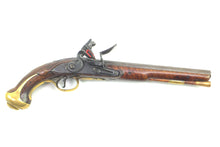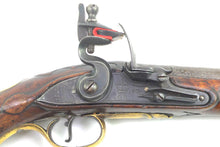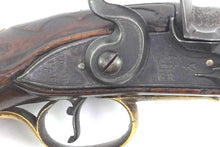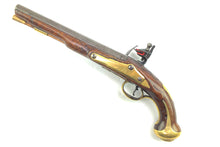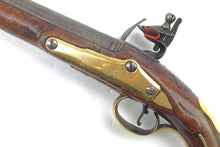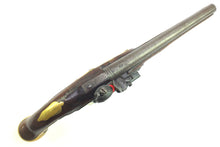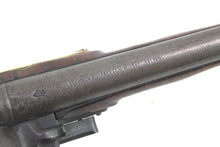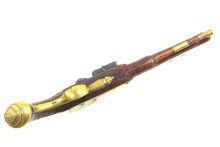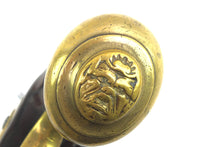
A Rare Royal Horse Guards Flintlock Pistol.
Missed out on this item? Click to view all current Antique Pistols & Revolvers Free UK delivery on all items
16 ½" overall, 10” round 20 bore barrel with King’s proof engraved 'Royal Horse Guards'. Flat border engraved lock with Tower 1756 at the tail. GR and inspectors marks under the faceted pan., chamfered frizzen spring with teardrop finial. Border engraved swan necked cock, border engraved faceted frizzen. With regulation brass mounts comprising long eared butt cap with grotesque mask, escutcheon, large side plate, brass trigger guard and one ramrod pipe. Brass tipped ramrod, walnut full stock, moulded around the lock and barrel tang, with store keepers marks. Initials 'A.F' carved at the bottom of the fore end.
Dated 1756
A very rare pistol in very good condition, ramrod an old replacement.
Royal Horse Guards in the Seven Years War
During the Seven Years' War the Blues fought alongside Prince Ferdinand. The largest cavalry regiment The Blues colonelcy was assumed by the Marquis of Granby. This great soldier understood the importance of morale. In the mould of Ligonier, a predecessor, he established a brave and efficient force. His successor, Henry Seymour Conway was one of the greatest colonels the regiment ever had over a 25-year period. Granby however retained a passionate interest in the welfare of The Blues; his generosity and hospitality expressed later in a legion of public houses. Granby was in charge of the second division at Battle of Minden Heath in August 1759. The Blues posted sentries called Vedettes, who were so close when the French attacked that the regiment was thrown back. The Blues were eager to charge in after the infantry surge to Minden walls, but owing to Lord George Sackville's orders the reinforcements were delayed. Sackville was court-martialled and found guilty of disobeying orders.
The allies had saved Hanover, and driven Marshall Contades back towards the Rhine. By December 1759 The Blues were exhausted looking forward to a winter break at Osnabrück. Lieutenant-Colonel Johnston went to recruit in England; and found the Dragoon Guards who wanted to join for the superior conditions in The Blues. Granby was depressed by his son's death and that of his wife too, so he decided to set up a Widows' Fund, and to provide better regimental medical care. His cousin, Russell Manners was raised to battalion command; and King George II's interest in The Blues was inherited by George III. Granby commanded The Blues and The Royals on their march south from Paderborn. At Warburg on 31 July 1760 The Blues lined up in the centre, the British force of 8,000 stole a march on the French positions, and charging headlong into the enemy dispersed a force of 24,000. The famous 'Charge' on trumpet and bugle sent Granby's men into history:
"For we Rout'd all before us – Down precipices, over hollow ways we went like a torrent as the French general term'd it, which struck such a panick so that they [led] without firing a shot. The Marquis of Granby persued the enemy above 10 miles".
In February 1761, The Gold Stick, Granby led The Blues and others in a brilliant campaign. The French were hunkered down when surprised by the allies on the march, driving them back 50 miles over muddy roads. The regiment was present in the summer at the Villinghausen when they took a force twice their size led by Marshall Soubise, with the flexible use of artillery fire; the cavalry unable to gallop in the terrain. 15th Light Dragoons and The Blues encountered a skirmishing force at Wilhelmsthal on 1 July 1761. The cavalry realizing the enemy's presence took the initiative, demoralizing the French while the infantry finished. ADC Henry Townshend wounded at Vellinghausen, was killed with a trooper and three horses. Henry Seymour Conway marched the regiment to a triumphal return to England in March 1763. On demobilization, the troopers were reduced from 52 to 29 men per troop.
If Granby's grief at his son's loss was saddening, the crippling reductions to The Blues, according to William Pitt the Elder doomed "the bravest men the world ever saw to be sent to starve in country villages and forget their prowess." The harvest failures of the 1760s were compounded by rioting. The Blues were depressed to leave ex-comrades in Germany; they were used as militia for policing duties. Granby died in January 1770.









